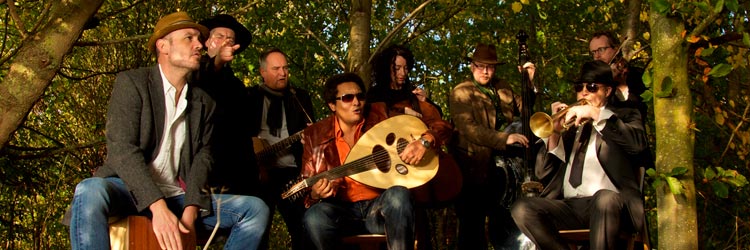
Brickwork Lizards: “The more we play together, the more music from bygone times we discover”
With influences stretching back to the Ottoman Empire, we just had to learn a little more about this Oxford group
Brickwork Lizards, Oxford’s premier Arabic jazz-folk ensemble, formed when Egyptian vocalist and oud player Tarik Beshir met singer Tom O’Hawk, a stalwart of the city’s scene. Having bonded over mutual music tastes they formed a group and their first album bridged the divide between Arabic and Western sounds. Seven years on from the release of Zaman, they have returned with follow-up Haneen – a record which once again brings together their vast influences, and also contains reinterpretations of traditional material.
With such a unique sound, we wanted to hear a little bit more about how their songs come together. Here, Tarik, Tom and Spencer (Williams) provide us with just that…
How did you develop your sound – is it a natural distillation of your influences or something you had to work on and refine?
“The Brickwork Lizards’ sound is really a melting pot of ideas that come from individual members’ influences. One thing we all have in common is a very wide taste in music. A great part of it was inspired by Tom O’Hawk and Tarik Beshir’s love for the 1930s/40s vocal harmony group, The Ink Spots, and the great jazz and doo-wop artists of that era.
“The band also have a passion for world music, which encompasses a lot of styles. Other influences can clearly be heard in the band’s repertoire, from delta blues to county & western and beyond. We’re always refining our sound, in fact, we often change arrangements of songs we wrote years ago.”
How much research goes into discovering the traditional material that you’ve recorded – or are they songs you already know?
“Tarik’s in-depth knowledge and passion for ancient Middle Eastern music is a big factor. He often brings long-forgotten tunes to the band for consideration, either songs that he grew up listening to in Egypt or picked up along the way. Other members have also unearthed classic tunes. Generally, whoever brings an old tune to the band tends to know the story behind it.”
What then is the process of making them into a Brickwork Lizards song?
“The band have always strived to create something new for people who know the traditional versions or introduce fans to amazing songs from a bygone era. In some cases, these traditional tunes been recorded many times, such as the Algerian standard Yah Rayeh. The band then puts its own unique spin on them by taking the arrangements and adding new sections and Western instrumentation.

Brickwork Lizards: “All songs go through a rigorous process of refinement”
“We learn the song first, understand it, then we start to look at who sees what aspects in it with a contemporary eye and without disrespecting the tradition. A good example is Fortune My Foe, a John Dowland ballad from the 16th century that we turned into an eerie, theatrical piece but the vocal style remained in the classic form.”
What’s the key factor in keeping a unique identity while combining different sounds and genres?
“There’s a unique combination of musicians and instruments that make up the Brickwork Lizards and we all share an enthusiasm for the songs, regardless of the different genres we blend. We don’t necessarily aim to stick to that unique identity but it just seems to naturally manifest itself each time we take on an old tune or write a new one. The key factors are keeping an open mind, ensuring everyone in the band is involved in bringing the songs to life.”
How does the group dynamic work in a songwriting context?
“There are no strictly defined roles within the band but it’s usually the case that either Tarik, Spencer or Tom will bring an idea to the table for the group to work on collectively. Sometimes it’s a germ of an idea for the band to jam around and other times they’re more fully formed ideas. Sometimes Tarik will suggest a piano part to Steve [Preston, keyboardist] and someone else might suggest an oud part to Tarik, so it’s not a case of everyone doing their own thing in isolation. Everyone has their own take on how songs should sound and that all gets put into the mix. Sometimes a song can take a while to come to fruition – some songs never do or they may come back on the table years later. All songs go through a rigorous process of refinement and only see the light of day when they’re ready to be performed.”
Has that process changed over the decade that you’ve been together?
“Because the band is twice the size it was when we started, we do have the options to be more ambitious with our arrangements. The more we play together, the more music from bygone times we discover which ironically sometimes adds a fresher perspective on our songwriting. The themes of our songs have also broadened over the years as new members have joined and we’re tackling much wider issues and perspectives in our songs.”

Brickwork Lizards: “What we lose in live energy we gain in perfecting a listening experience for the listener”
Tarik, how does your work outside of the group then inform what you do with the band?
“I am a freelance structural engineer, both are creative works and so my brain is always engaged – don’t forget that some of the scientists-cum-philosophers-cum-engineers of the Islamic empire were musicians as well, so I like to think I’m continuing that tradition. I don’t take myself that seriously though I promise!
“I also play in Oxford Maqam, a band that focusses on the music of Turkey and the Arab world from the 19th and 20th centuries. I don’t think that necessarily informs what we do but sometimes if a tune doesn’t’ work for Oxford Maqam, it may end up on the Lizards’ table.”
You mention that the new album is about “paying homage to great traditions…” how did that theme come together?
“As well as the more obvious, traditional Middle Eastern pieces, every song on the album is arranged in song form i.e. we employed the classic intro, verse, chorus, middle section and outro format. Some of the lyrics like, ‘You threw my heart right on the floor, think I’d still love you? Not anymore,’ from We’re Through pay homage to the 1920s and 30s lyrical style. Old Fashioned Song is the mix of all those things and tips a hat to crooner songs and wartime radio broadcasts.”
Is it a challenge to capture the unique energy of your live shows on record?
“What we lose in live energy we gain in perfecting a listening experience for the listener. However, we’re always well-rehearsed and ready to go from the stage to the studio, where we start with a full band recording take, as if we’re playing live. Then we add layers such as more vocals, harmony parts and the odd bit of studio trickery. Having a live take as the basis of the track helps to keep the organic, less-produced sound. We then try to recreate what we did in the studio, on stage.”
Lastly, from vision to recording to release, what will be your overriding memory of creating this record?
“It’s difficult to remember everything as it took nearly five years from starting recording to release! Band members came and went and there are songs we started recording that never made it onto the album (maybe for a future release). It took a long time but we grew exponentially as a band in the process and we all knew that when it was finished, it was the best it could be. Let’s hope we can get the next album out before 2023!”
Interview: Duncan Haskell
Check out the band’s latest video below, then head over to brickworklizards.com




































Related Articles